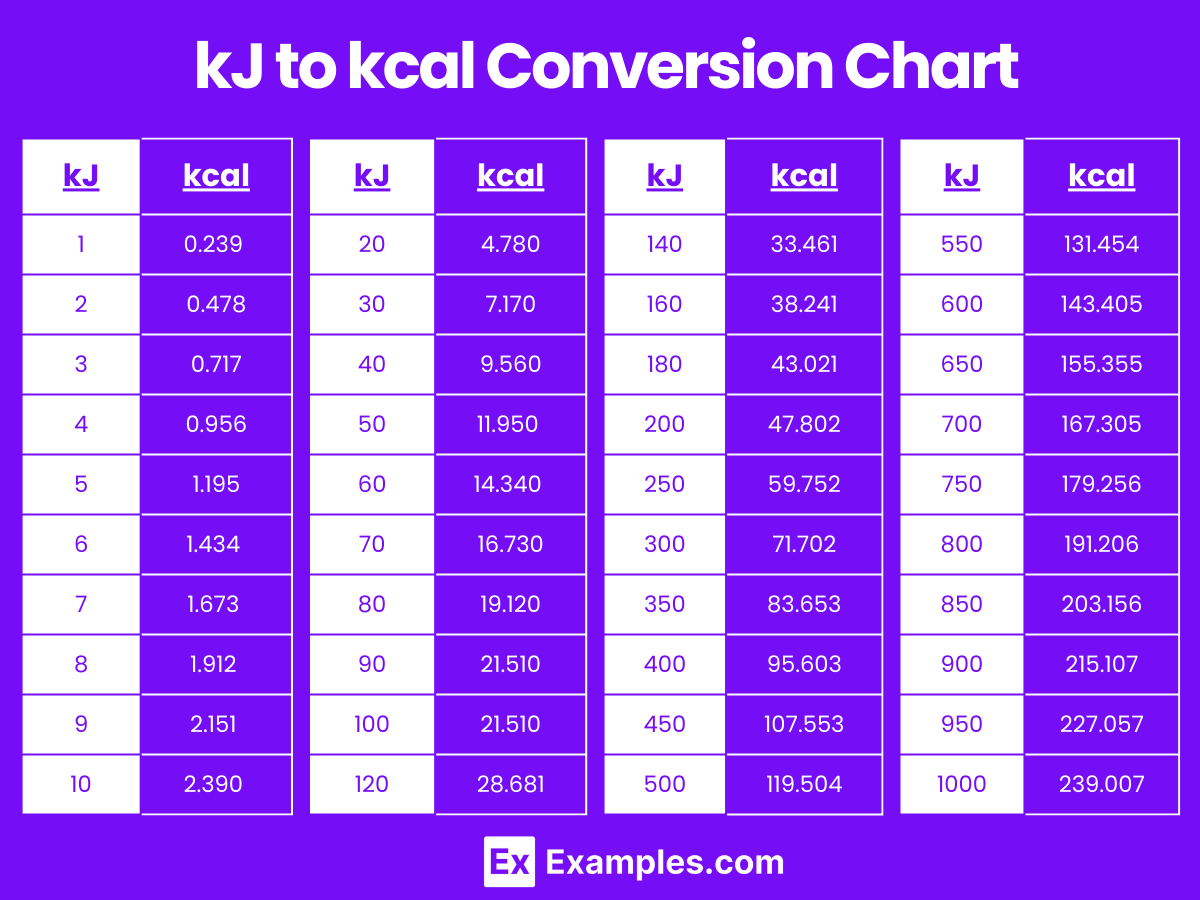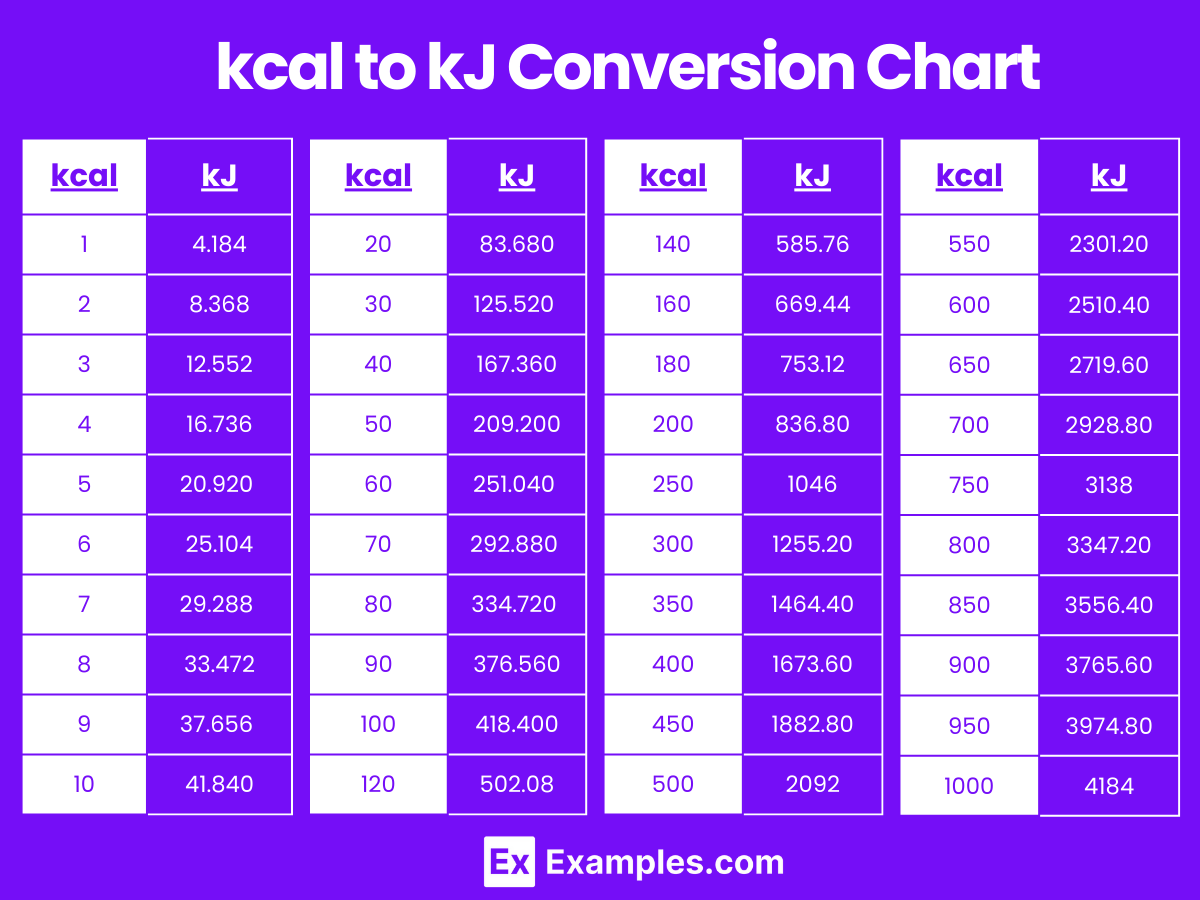Effortlessly convert kilojoules to kilocalories and vice versa with Examples.com. Enter your data for quick, accurate conversions.
kJ to kcal
Formula: Energy in Kilocalories (kcal) = Energy in Kilojoules (kJ) x 0.239005736
Kilojoule :
Kilocalorie :
| Kilojoules | Kilocalories |
|---|---|
| 1 | 0.239005736 |
kcal to kJ
Formula: Energy in Kilojoules (kJ) = Energy in Kilocalories (kcal) ∕ 0.239005736
Kilocalorie :
Kilojoule :
| Kilocalories | Kilojoules |
|---|---|
| 1 | 4.184000002409984 |
Energy Converters to Kilojoule
Energy Converters to Kilocalorie
Conversion Factors:
- Kilojoules to Kilocalories: 1 kilocalorie = 4.184 kilojoules
- Kilocalories to Kilojoules: 1 kilojoule = 1/4.184 kilocalories
How to Convert Kilojoules to Kilocalories:
To convert kilojoules to kilocalories, divide the number of kilojoules by 4.184.
Kilocalories (kcal) = Kilojoules (kJ)/4.184
Example: Convert 2000 kilojoules to kilocalories.
Kilocalories = 2000 kJ/4.184 = 478.68 kcal
How to Convert Kilocalories to Kilojoules:
To convert kilocalories to kilojoules, multiply the number of kilocalories by 4.184.
Kilojoules (kJ) = Kilocalories (kcal)×4.184
Example: Convert 3 kilocalories to kilojoules.
Kilojoules = 3 kcal×4.184 = 12.552 kJ
Kilojoules to Kilocalories Conversion Table
| Kilojoules (kJ) | Kilocalories (kcal) |
|---|---|
| 1 kJ | 0.239 kcal |
| 2 kJ | 0.478 kcal |
| 3 kJ | 0.717 kcal |
| 4 kJ | 0.956 kcal |
| 5 kJ | 1.195 kcal |
| 6 kJ | 1.434 kcal |
| 7 kJ | 1.673 kcal |
| 8 kJ | 1.912 kcal |
| 9 kJ | 2.151 kcal |
| 10 kJ | 2.390 kcal |
| 20 kJ | 4.780 kcal |
| 30 kJ | 7.170 kcal |
| 40 kJ | 9.560 kcal |
| 50 kJ | 11.950 kcal |
| 60 kJ | 14.340 kcal |
| 70 kJ | 16.730 kcal |
| 80 kJ | 19.120 kcal |
| 90 kJ | 21.510 kcal |
| 100 kJ | 23.900 kcal |
kJ to kcal Conversion Chart

Kilocalories to Kilojoules Conversion Table
| Kilocalories (kcal) | Kilojoules (kJ) |
|---|---|
| 1 kcal | 4.184 kJ |
| 2 kcal | 8.368 kJ |
| 3 kcal | 12.552 kJ |
| 4 kcal | 16.736 kJ |
| 5 kcal | 20.920 kJ |
| 6 kcal | 25.104 kJ |
| 7 kcal | 29.288 kJ |
| 8 kcal | 33.472 kJ |
| 9 kcal | 37.656 kJ |
| 10 kcal | 41.840 kJ |
| 20 kcal | 83.680 kJ |
| 30 kcal | 125.520 kJ |
| 40 kcal | 167.360 kJ |
| 50 kcal | 209.200 kJ |
| 60 kcal | 251.040 kJ |
| 70 kcal | 292.880 kJ |
| 80 kcal | 334.720 kJ |
| 90 kcal | 376.560 kJ |
| 100 kcal | 418.400 kJ |
kcal to kJ Conversion Chart

Difference Between Kilojoules to Kilocalories
| Aspect | Kilojoules (kJ) | Kilocalories (kcal) |
|---|---|---|
| Unit of Measurement | Kilojoule is a unit of energy in the metric system. | Kilocalorie is a unit of energy in the metric system, commonly used in nutrition. |
| Symbol | Represented by “kJ”. | Represented by “kcal”. |
| Conversion Factor | 1 kilojoule = 0.239 kilocalories. | 1 kilocalorie = 4.184 kilojoules. |
| Common Use | Widely used in scientific contexts and in most countries to express energy values. | Commonly used in nutrition to indicate the energy content in food. |
| Global Preference | Preferred in many countries for energy-related measurements, especially in scientific literature. | Often used in the United States and some other countries for food energy values. |
| Energy Expression | Expresses energy in joules (1 kilojoule = 1000 joules). | Expresses energy in terms of calories (1 kilocalorie = 1000 calories). |
| Nutritional Labeling | Seen on food packaging in countries using the metric system, e.g., Australia, New Zealand. | Seen on food packaging, particularly in the United States. |
| Historical Context | Part of the International System of Units (SI), adopted globally for various scientific measures. | Originates from the concept of calorie used to measure heat energy in food. |
1. Solved Examples on Converting Kilojoules to Kilocalories
Example 1:
Convert 50 kilojoules to kilocalories.
Kilocalories (kcal) = Kilojoules (kJ)/4.184
Calculation: Kilocalories = 50 kJ/4.184 = 11.95 kcal
Example 2:
Convert 120 kilojoules to kilocalories.
Calculation: Kilocalories = 120 kJ/4.184 = 28.68 kcal
Example 3:
Convert 250 kilojoules to kilocalories.
Calculation: Kilocalories = 250 kJ/4.184 = 59.75 kcal
Example 4:
Convert 360 kilojoules to kilocalories.
Calculation: Kilocalories = 360 kJ/4.184 = 86.06 kcal
Example 5:
Convert 500 kilojoules to kilocalories.
Calculation: Kilocalories = 500 kJ4.184 = 119.47 kcal
2. Solved Examples on Converting Kilocalories to Kilojoules
Example 1:
Convert 10 kilocalories to kilojoules.
Kilojoules (kJ) = Kilocalories (kcal)×4.184
Calculation: Kilojoules = 10 kcal×4.184 = 41.84 kJ
Example 2:
Convert 25 kilocalories to kilojoules.
Calculation: Kilojoules = 25 kcal×4.184 = 104.60 kJ
Example 3:
Convert 50 kilocalories to kilojoules.
Calculation: Kilojoules = 50 kcal×4.184 = 209.20 kJ
Example 4:
Convert 75 kilocalories to kilojoules.
Calculation: Kilojoules = 75 kcal×4.184 = 313.80 kJ
Example 5:
Convert 100 kilocalories to kilojoules.
Calculation: Kilojoules = 100 kcal×4.184 = 418.40 kJ
How accurate is the conversion between kilojoules and kilocalories?
The conversion is accurate as per the defined conversion factor, 1 kilocalorie = 4.184 kilojoules. Calculations based on this factor are precise and reliable.
Why do we use kilojoules and kilocalories?
Kilojoules and kilocalories are both units of energy. Kilojoules are commonly used in scientific contexts and in most countries to express energy values, while kilocalories are commonly used in nutrition to indicate the energy content in food, especially in the United States.
Is the term “calorie” the same as “kilocalorie”?
In nutritional contexts, “calorie” often refers to a kilocalorie (kcal), which is equal to 1,000 small calories (cal). The term kilocalorie is more precise but is commonly abbreviated to calorie in everyday use.
What is the importance of converting kilojoules to kilocalories?
Converting kilojoules to kilocalories is important for understanding nutritional information on food labels, especially when comparing energy content across different measurement systems. It helps in making informed dietary choices based on familiar units.
Are kilojoules and kilocalories interchangeable in recipes?
When following recipes, it’s important to use the specified unit of measurement to ensure accuracy. If a recipe lists energy content in kilojoules, you can convert it to kilocalories if needed, and vice versa, using the conversion factor.

